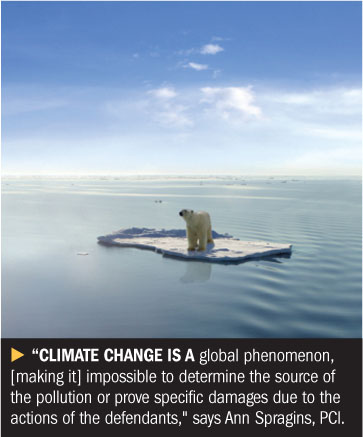Insurance-industry lawyers are calling a global-warming lawsuit based on nuisance laws “the most significant case for the property and casualty insurance industry before the U.S. Supreme Court this term.”
 Oral arguments in the case, American Electric Power v. Connecticut, No. 10-174, were heard April 19 before the court.
Oral arguments in the case, American Electric Power v. Connecticut, No. 10-174, were heard April 19 before the court.
Ann Spragins, senior vice president, secretary and general counsel for the Property Casualty Insurers Association of America (PCI), says the case “is vitally important for [P&C] insurers as it could help determine the scope and direction of climate-change regulation and liability issues.”
The case stems from a 2004 lawsuit by six states—California, Connecticut, Iowa, New York, Rhode Island and Vermont—alleging that five coal-burning utilities have created a public nuisance by contributing to climate change.
The utilities and the Obama administration want the Environmental Protection Agency (EPA) to enforce laws against global warming. But the states contend the EPA is not acting to limit carbon-dioxide emissions that lead to global warming.
She says the risk for businesses, insurers and ultimately consumers “is the potential for environmental regulation to be created on a case-by-case basis through nuisance suits.”
“This could lead to inconsistent rulings and requirements across the country—and virtually any business that allegedly contributed to climate change could become the target of a lawsuit,” Spragins says.
She adds that these questions are “political in nature, and Congress and the [EPA]—rather than the courts—are the appropriate governing bodies to determine these issues.”
“We urged the court to take the position that environmental public-nuisance suits are viable only if the source of the pollution is limited to a well-defined geographical locality and the alleged damage can be traced or directly linked to the defendants' actions,” Spragins says. “Since climate change is a global phenomenon, it is impossible to determine the source of the pollution or prove specific damages due to the actions of the defendants.”
During the oral arguments, a representative of the Obama administration joined with power-company lawyers in calling the scope of the lawsuit unprecedented, involving national and international issues outside the power of the courts.
The utilities are American Electric Power Co. Inc., Southern Co., Xcel Energy Inc. and Cinergy Corp., which Duke Energy Corp. acquired in 2006. The Tennessee Valley Authority (TVA), which joined the lawsuit, wants it dismissed.
Want to continue reading?
Become a Free PropertyCasualty360 Digital Reader
Your access to unlimited PropertyCasualty360 content isn’t changing.
Once you are an ALM digital member, you’ll receive:
- Breaking insurance news and analysis, on-site and via our newsletters and custom alerts
- Weekly Insurance Speak podcast featuring exclusive interviews with industry leaders
- Educational webcasts, white papers, and ebooks from industry thought leaders
- Critical converage of the employee benefits and financial advisory markets on our other ALM sites, BenefitsPRO and ThinkAdvisor
Already have an account? Sign In Now
© 2024 ALM Global, LLC, All Rights Reserved. Request academic re-use from www.copyright.com. All other uses, submit a request to [email protected]. For more information visit Asset & Logo Licensing.








